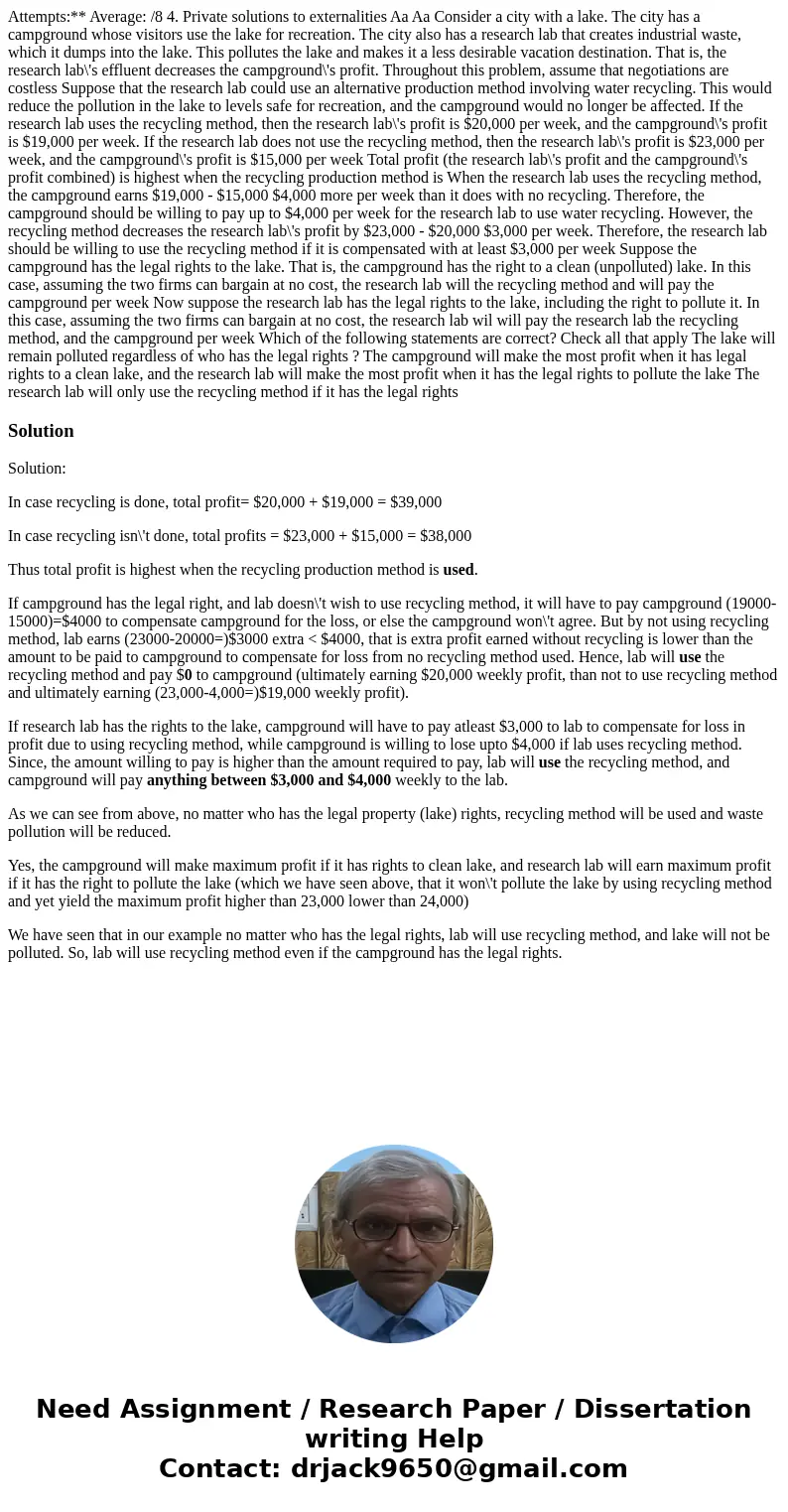Attempts:** Average: /8 4. Private solutions to externalities Aa Aa Consider a city with a lake. The city has a campground whose visitors use the lake for recreation. The city also has a research lab that creates industrial waste, which it dumps into the lake. This pollutes the lake and makes it a less desirable vacation destination. That is, the research lab\'s effluent decreases the campground\'s profit. Throughout this problem, assume that negotiations are costless Suppose that the research lab could use an alternative production method involving water recycling. This would reduce the pollution in the lake to levels safe for recreation, and the campground would no longer be affected. If the research lab uses the recycling method, then the research lab\'s profit is $20,000 per week, and the campground\'s profit is $19,000 per week. If the research lab does not use the recycling method, then the research lab\'s profit is $23,000 per week, and the campground\'s profit is $15,000 per week Total profit (the research lab\'s profit and the campground\'s profit combined) is highest when the recycling production method is When the research lab uses the recycling method, the campground earns $19,000 - $15,000 $4,000 more per week than it does with no recycling. Therefore, the campground should be willing to pay up to $4,000 per week for the research lab to use water recycling. However, the recycling method decreases the research lab\'s profit by $23,000 - $20,000 $3,000 per week. Therefore, the research lab should be willing to use the recycling method if it is compensated with at least $3,000 per week Suppose the campground has the legal rights to the lake. That is, the campground has the right to a clean (unpolluted) lake. In this case, assuming the two firms can bargain at no cost, the research lab will the recycling method and will pay the campground per week Now suppose the research lab has the legal rights to the lake, including the right to pollute it. In this case, assuming the two firms can bargain at no cost, the research lab wil will pay the research lab the recycling method, and the campground per week Which of the following statements are correct? Check all that apply The lake will remain polluted regardless of who has the legal rights ? The campground will make the most profit when it has legal rights to a clean lake, and the research lab will make the most profit when it has the legal rights to pollute the lake The research lab will only use the recycling method if it has the legal rights
Solution:
In case recycling is done, total profit= $20,000 + $19,000 = $39,000
In case recycling isn\'t done, total profits = $23,000 + $15,000 = $38,000
Thus total profit is highest when the recycling production method is used.
If campground has the legal right, and lab doesn\'t wish to use recycling method, it will have to pay campground (19000-15000)=$4000 to compensate campground for the loss, or else the campground won\'t agree. But by not using recycling method, lab earns (23000-20000=)$3000 extra < $4000, that is extra profit earned without recycling is lower than the amount to be paid to campground to compensate for loss from no recycling method used. Hence, lab will use the recycling method and pay $0 to campground (ultimately earning $20,000 weekly profit, than not to use recycling method and ultimately earning (23,000-4,000=)$19,000 weekly profit).
If research lab has the rights to the lake, campground will have to pay atleast $3,000 to lab to compensate for loss in profit due to using recycling method, while campground is willing to lose upto $4,000 if lab uses recycling method. Since, the amount willing to pay is higher than the amount required to pay, lab will use the recycling method, and campground will pay anything between $3,000 and $4,000 weekly to the lab.
As we can see from above, no matter who has the legal property (lake) rights, recycling method will be used and waste pollution will be reduced.
Yes, the campground will make maximum profit if it has rights to clean lake, and research lab will earn maximum profit if it has the right to pollute the lake (which we have seen above, that it won\'t pollute the lake by using recycling method and yet yield the maximum profit higher than 23,000 lower than 24,000)
We have seen that in our example no matter who has the legal rights, lab will use recycling method, and lake will not be polluted. So, lab will use recycling method even if the campground has the legal rights.

 Homework Sourse
Homework Sourse